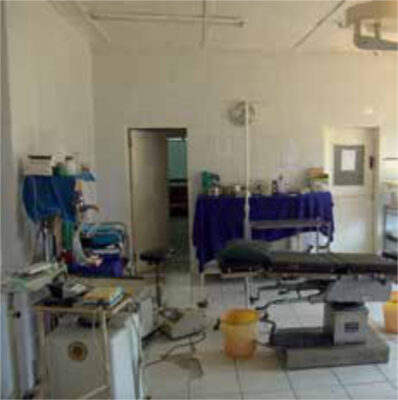Main content
Eric Borgstein serves as professor of surgery at the University of Malawi College of Medicine and simultaneously as a consultant in paediatric surgery at the Queen Elizabeth Central Hospital in Blantyre, Malawi. During his career, he has played an essential role in the expansion of local surgical capacity by setting up training programmes for medical students and non-physician clinicians or clinical officers (COs) in Malawi as well as for surgical specialty qualifications. He currently functions as secretary general of the College of Surgeons of East, Central and Southern Africa (COSECSA). MTb spoke with him on the implementation of the CO surgical training and two related surgical projects in Malawi (COST-Africa and SURG-Africa), aiming for the implementation of surgical systems. We also discussed the surgical specialty training through COSECSA.
Development of clinical officers in Malawi
“Historically in Malawi, CO training started even before the establishment of the medical school in 1991. Before that time, in the 70s-80s, most district hospitals in Malawi had COs and one or more expatriate doctors with a training in Tropical Medicine. Even a much more recent survey showed that 92% of district surgical work (primarily obstetric) is performed by non-surgeons (COs), and 95% of the anaesthesia providers are non-physicians.[1 – ed.] In time, the tropical doctors went back to their home countries and were replaced in the district by new graduates from the College of Medicine who had little formal surgical training. Many of the COs rotated between departments and into administrative positions or joined NGOs in search of new opportunities, so the surgical capacity in the district hospitals diminished.”
“In order to improve the surgical care of patients at the district hospitals, a plan was formulated by the College of Medicine and other stakeholders to develop a specialisation degree course in surgery for COs in Malawi. The basic CO training consists of four years of practically orientated training with a diploma. A bachelor’s degree course would provide them with a higher level of surgical skills training and would lead to promotion opportunities and a better outlook on salary.”
The clinical officer surgical training in Africa (COST-Africa) project (2011-2016) in both Malawi and Zambia offered a three-year BSc surgical specialisation course which also included studying the impact of the training. The project was evaluated as having a very significant impact on the surgical capacity and as being cost-effective. The subsequent SURG-Africa project is the follow-up project to provide mentorship and further strengthen the surgical systems in the district hospitals.[2]

The set-up of the training programme
The curriculum of the BSc surgery for clinical officers was based on work done by Dr Peter Jiskoot who developed a surgical course previously for the Mzuzu University in northern Malawi. Prof. Borgstein and his colleagues, together with the investigators of COST-Africa, built on Jiskoot’s work to initially establish the curriculum for the BSc surgery for the College of Medicine in Blantyre. Subsequently, five other courses were developed: obstetrics and gynaecology, paediatrics, general medicine, orthopaedics and anaesthesia. The curriculum has since been revised as part of the ongoing quality assurance activities of the College of Medicine. Requirements for application to the course are a diploma in clinical medicine and a minimum of two years’ working experience.
The first (general) part of the curriculum consists of six months basic science theory including biomedical sciences, pathology and human physiology, followed by a modular part (based on specialty) of 24 months, combining practice and theory in a district hospital. The final part includes a training in advanced surgical skills in a central hospital lasting for eight months.[2]
“Initially, the programme was set up as part of a European Union funded research project COST-Africa, so there were few financial constraints when implementing it. The subsequent BSc surgery groups, outside of the project, were more difficult to organise since the Ministry of Health did not supply the necessary funds”. However, according to Borgstein, “there is still a demand for specialised clinical officers since it will take another generation before there will be an adequate number of trained doctors and specialists in the district hospitals.”
On-site supervision and mentoring
As part of the follow-up SURG-Africa project*, which aside from Malawi also involves Zambia and Tanzania (2017-2021), surgical specialists, obstetrician/ gynaecologists and anaesthesiologists are trained to supervise and mentor district hospital surgical staff, including COs. “Some of the supervisors are experienced COs themselves, others are surgeons or specialist trainee. General surgical procedures that are performed during supervision include exploratory laparotomy, trauma surgery and ruptured spleen procedures. However, the supervision is also very dependent on the level of expertise of the surgical staff in the district hospitals, which means that the supervisors tend to focus more on the most commonly performed procedures such as hernia repairs. In order to adapt to the surgical needs of the hospital, they tried sending more senior surgeons or senior surgical trainees to act as mentor and carry out the supervision.” Another solution, suggested by Borgstein, might be in the form of remote learning, both for continuous professional development and more real-time support for surgery in district hospitals. This has gained more importance specifically during the current Covid era.
“A big success for SURG-Africa was the establishment of a surgical consultation network: WhatsApp is used as a platform to send encrypted messages and images from the district clinicians to central hospital consultants. COs can then consult experienced clinicians by sending pictures or questions regarding their cases. This procedure was ethically cleared by the medical council in Malawi, as patients remain anonymous and pictures are not shared without permission.”
This form of consultation is very cost-effective not only because of the low equipment costs but also by preventing unnecessary referrals to a city hospital and, moreover, by reducing costs and waiting time for the patients. There is also a significant teaching component as all the members of the group learn about the best way to prepare emergency cases for referral, which patients to refer and when, and receive feedback on patients referred.[3]
Evaluation and expansion of surgical care
“Especially for a small country like Malawi, the upscaling of surgical training for COs to a BSc level has been a big achievement. The number of people interested in training remains high, and the college fees are not that expensive. Currently, the College of Medicine provides the training courses and has developed similar courses in other specialties. District hospitals tend to perform more surgical interventions and thus need more specialty trained COs. Furthermore, while surgical care used to have little or no dedicated funding, district hospitals are now paying more attention to the expansion and provision of quality surgical care for their patients.
However, there are still many challenges that hinder the expansion of surgical health services. There tends to be little interest in surgery from the supervising and managing district medical staff. In Malawi, historically, the doctors were trained to be more involved with the management processes at the district hospitals and less involved in clinical work, especially not in surgery. Hence surgery is often of lesser priority in the district health plans than for instance obstetrics and gynaecology. As a result, the district hospitals are under-resourced in terms of anaesthesia availability and surgical consumables such as sutures, so surgical cases often have to be referred to the city hospitals. Most importantly, the success of these projects largely depends on the partnership of the consortium member institutions involved”, according to Borgstein.
COSECSA and the College of Medicine in Malawi focused on the local components and relationships to set up the surgical training and mentoring and expand the care in the district hospitals. COSECSA, the largest training institute in Sub-Saharan Africa, provides specialist training for surgeons and, they always encourage programmes that improve the quality of surgery. In many different countries, they also engage in the training of clinical officers and non-specialist surgeons through their support and involvement in quality control of the different projects. Borgstein: “COSECSA is so successful because it was developed by clinicians aware of the surgical needs and problems, while their involvement in the different projects and countries evolved over time, establishing a natural collaboration. By the end of 2020, COSECSA had trained 500 surgeons and provided training programmes in over hundred sites in fourteen countries and in seven different specialties within surgery: paediatric, plastic, cardio thoracic and neuro surgery, urology, ENT and orthopaedics.” In the future, COSECSA aims to train the surgical trainees over all the countries with similar training programmes (including Malawi, Zambia, and Tanzania).[4]
In conclusion, Borgstein mentions that the role of general surgery has been changing a lot recently, with a higher demand for surgical specialist care and COs with a BSc working at the district hospitals. There is, however, still room for improvement in the district hospitals as the focus remains on other priorities, and they could upscale quality surgical care with limited costs.
Acknowledgement: R. van Egmond for contribution to this interview
*More information on SURG-Africa, their publications, and the consortium partners, can be found here: https://www.surgafrica.eu/
References
- Henry JA, Frenkel E, Borgstein E, et al. Surgical and anaesthetic capacity of hospitals in Malawi: key insights. Health Policy Plan. 2015 Oct;30(8):985-94. doi: 10.1093/heapol/czu102
- Gajewski J, Borgstein E, Bijlmakers L, et al. Evaluation of a surgical training programme for clinical officers in Malawi. Br J Surg. 2019 Jan 8;106:2156-e165. doi: 10.1002/bjs.11065
- Mwapasa G, Pittalis C, Clarke M, et al. Evaluation of a Managed Surgical Consultation Network in Malawi. World J Surg. 2021 Feb;4(2)5:356-61. doi: 10.1007/s0028-020-05809-
- Mooney C, Tierney S, O’Flynn E, et al. Analysing the operative experience of Paediatric Surgical Trainees in Sub-Saharan Africa using a web-based logbook. World J Surg. 2021 Apr;45(4):988-96. doi: 10.1007/s00268-020-05892-6



















































